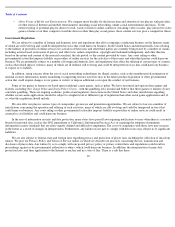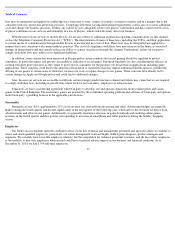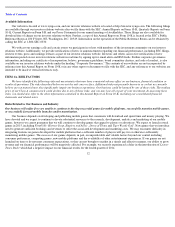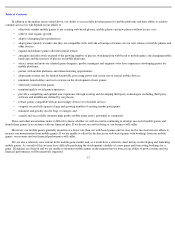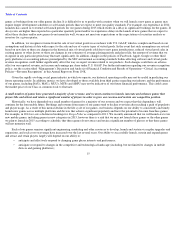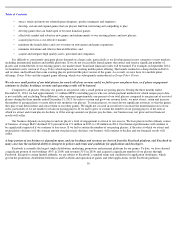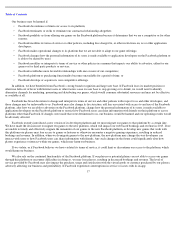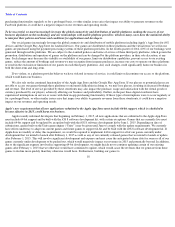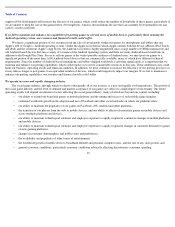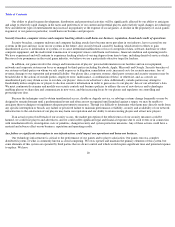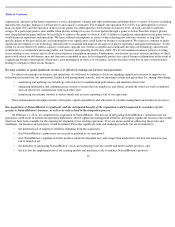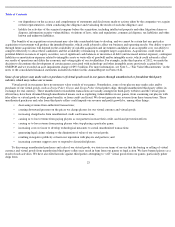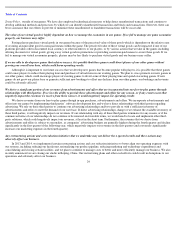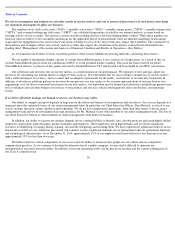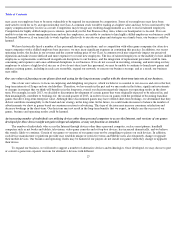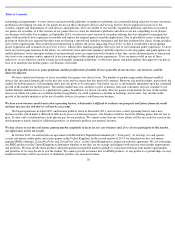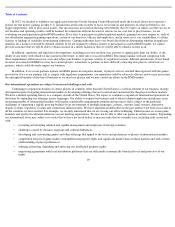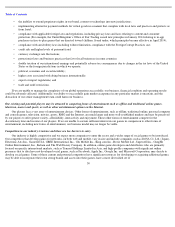Zynga 2014 Annual Report Download - page 23
Download and view the complete annual report
Please find page 23 of the 2014 Zynga annual report below. You can navigate through the pages in the report by either clicking on the pages listed below, or by using the keyword search tool below to find specific information within the annual report.
Table of Contents
Our ability to plan for game development, distribution and promotional activities will be significantly affected by our ability to anticipate
and adapt to relatively rapid changes in the tastes and preferences of our current and potential players and relatively rapid changes in technology.
New and different types of entertainment may increase in popularity at the expense of social games. A decline in the popularity of social games
in general, or our games in particular, would harm our business and prospects.
Security breaches, computer viruses and computer hacking attacks could harm our business, reputation, brand and results of operations.
Security breaches, computer malware and computer hacking attacks have become more prevalent in our industry, have occurred on our
systems in the past and may occur on our systems in the future. Any security breach caused by hacking, which involves efforts to gain
unauthorized access to information or systems, or to cause intentional malfunctions or loss or corruption of data, software, hardware or other
computer equipment, and the inadvertent transmission of computer viruses could harm our business, financial condition and operating results.
We have experienced and will continue to experience hacking attacks of varying degrees from time to time, including denial-of-service attacks.
Because of our prominence in the social game industry, we believe we are a particularly attractive target for hackers.
In addition, our games involve the storage and transmission of players’ personal information in our facilities and on our equipment,
networks and corporate systems run by us or managed by third-parties including Facebook, Apple, Microsoft and Google. Security breaches of
our systems or third-parties on whom we rely could expose us to litigation, remediation costs, increased costs for security measures, loss of
revenue, damage to our reputation and potential liability. Our player data, corporate systems, third party systems and security measures may be
breached due to the actions of outside parties, employee error, malfeasance, a combination of these, or otherwise, and, as a result, an
unauthorized party may obtain access to our data, our players’ data or our advertiser’s data. Additionally, outside parties may attempt to
fraudulently induce employees or players to disclose sensitive information in order to gain access to our players’ data or our advertiser’s data.
We must continuously examine and modify our security controls and business policies to address the use of new devices and technologies
enabling players to share data and communicate in new ways, and the increasing focus by our players and regulators on controlling and
protecting user data.
Because the techniques used to obtain unauthorized access, disable or degrade service, or sabotage systems change frequently or may be
designed to remain dormant until a predetermined event and often are not recognized until launched against a target, we may be unable to
anticipate these techniques or implement adequate preventative measures. Though it is difficult to determine what harm may directly result from
any specific interruption or breach, any failure or perceived failure to maintain performance, reliability, security and availability of our network
infrastructure to the satisfaction of our players may harm our reputation and our ability to retain existing players and attract new players.
If an actual or perceived breach of our security occurs, the market perception of the effectiveness of our security measures could be
harmed, we could lose players and advertisers, and we could suffer significant legal and financial exposure due to such events or in connection
with remediation efforts, investigation costs or penalties, changed security and system protection measures. Any of these actions could have a
material and adverse effect on our business, reputation and operating results.
Any failure or significant interruption in our infrastructure could impact our operations and harm our business.
Our technology infrastructure is critical to the performance of our games and to player satisfaction. Our games run on a complex
distributed system, or what is commonly known as cloud computing. We own, operate and maintain the primary elements of this system, but
some elements of this system are operated by third parties that we do not control and which would require significant time and potential expense
to replace. We have
20


